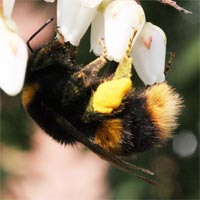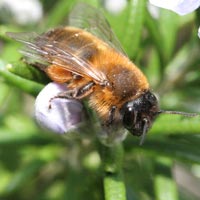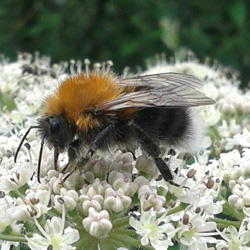Bees & Bee control

Buff-tailed bumble bee
“Bombus terrestris”
Bees in particular are environmentally very beneficial to man by pollinating crops. We usually liaise with local bee-keepers to relocate and domesticate feral honey bees (Apis Mellifera). It is a fact that honey bees are declining (colony collapse disorder) and becoming endangered.
Physical re-location is currently the only permitted method of removing bees. In addition, currently no insecticides are permitted for use on bees by law (Ficam W is currently being withdrawn – 2020). And the use of ANY insecticidal dust on bees is illegal by law – Companies who offer an insecticidal (dust) treatment for bees break the law and contravene “the label”. This is a piece of legislation which a allows the use of that particular insecticide for a number of specified pest species – bees have been taken off this list in 2019.
We do not treat / kill any bees nests under any circumstance!
We can advise, and can get you in touch with a local beekeeper if re-location is required. Sometimes we can re-locate bee hives if the situation permits this. There is a callout charge if the insects turn out to be an honey bee hive / swarm or bumble bees instead of wasps.
There are 250 bee species in the UK, including many Bumble (Bombus sp.), miner (Andrena sp.) and Mason bees (Osmia sp.) which are also beneficial for pollination of crops, are harmless and will only sting if extremely provoked.

Red mason bee “Osmia rufa”
Tree bumble bees

Tree bumble bee
“Bombus hypnorum
A relative newcomer to the UK is the Tree Bumble bee (Bombus hypnorum). This species has been spreading throughout Britain since 2001, whereas before it was restricted to mainland Europe. It is now very common in the UK. Tree bumble bees use bird nest boxes are often as a nesting site. Be ware! This bumble bee will only attack / sting if their nest is in danger, in contrast to most other, more docile bumble bee species. For example, this species will become agitated if a lawn mower gets too close to their nest. In general, they will be constructing their nests in March/April and usually abandon their nest by June. More information on Tree Bees (Bombus hypnorum) can be found on this link: bumlebeeconservation.org/white-tailed-bumblebees/tree-bumblebee
Again we do not destroy bumble bee hives (They dissapear at the beginning of June). We charge a callout fee if the insect turns out to be a tree bumble bee nest.
For more information on bees and Hymenoptera in general, please visit the BWARS website.
